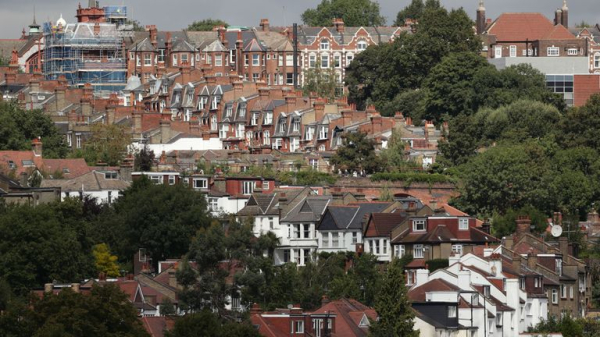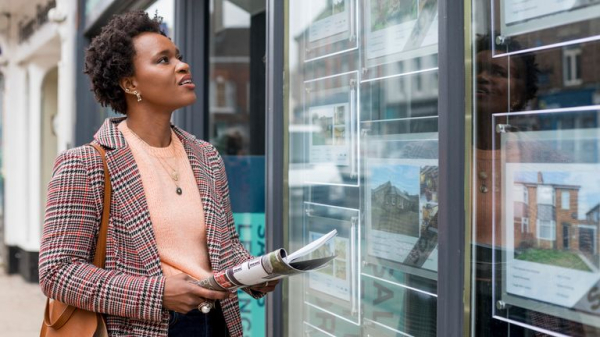Bigger-than-expected fall in house prices as rate hikes hit market

House prices fell by 5.3% in the year to August – a bigger-than-expected drop, according to Nationwide.
This means the typical home is now worth £14,600 less than 12 months ago – with an average property price of £259,153.
Nationwide’s chief economist, Robert Gardner, says the softening is “not surprising” – with interest rate hikes by the Bank of England sending mortgage payments higher.
Activity in the housing market is currently running well below pre-pandemic levels – with mortgage approvals about 20% below the 2019 average in recent months.
But Mr Gardner struck an upbeat note after Nationwide’s latest House Price Index was released – and said “a relatively soft landing is still achievable.”
He added: “In particular, unemployment is expected to remain low (below 5%) and the vast majority of existing borrowers should be able to weather the impact of higher borrowing costs, given the high proportion on fixed rates, and where affordability testing should ensure that those needing to refinance can afford the higher payments.”
And while activity may remain subdued in the near term, Mr Gardner believes a mix of income growth and lower house prices could improve affordability if mortgage rates cool.
Tesco cuts prices – and it’s good news for parents | Cost of living latest
Andrew Wishart, senior property economist at Capital Economics, believes this “marks the start of a significant further drop in house prices”.
He believes that, by mid-2024, house prices will be 10.5% below their August 2022 peak – with mortgage rates set to remain between 5.5% and 6% for the next 12 months.
Analysis: For many, house prices can't fall far enough

Paul Kelso
@pkelso
The UK housing market has long lost touch with reality – but the recent modest fall in prices, confirmed by the Nationwide house price index figures for August, does follow the logic of economic trends.
After 14 consecutive Bank of England increases pushed the base rate to 5.25% and many mortgages beyond 6%, it would have been a surprise had the housing market not been affected.
While prices have been falling the volume of completions has stalled too, reflecting perhaps that many potential movers are waiting to see where rates will peak before they take the plunge.
For those looking to sell or buy from an existing home the impact will be largely theoretical, with the cost of remortgaging and the swingeing impact of stamp duty far more consequential in decision making.
A drop of more than 5% will be most welcome to first-time buyers, but the benefit will likely be wiped out by the increased cost of the mortgage required to get on the ladder in the first place.
For millions, prices cannot fall far enough to make that first step realistic, the hike in borrowing costs compounding an affordability crisis that has seen the average house price balloon to eight times the average wage in two decades.
According to Nationwide, there was a 25% drop in first-time buyers in the first half of 2023 when compared with 2019.
“A first-time buyer earning the average wage and buying a typical first-time buyer property with a 20% deposit would now see their monthly mortgage payment absorb over 40% of their take-home pay (with a mortgage rate of 6%) – well above the long run average of 29%,” Mr Gardner added.
There has also been a shift in the types of properties being purchased – with a big decline in demand for detached houses as buyers look for smaller, less expensive places.
Additional housing bills are piling more misery on families at a time when the main measure of inflation is easing back from the highs of last winter, when unprecedented energy costs hit Western economies.
The evolving cost of living crisis has squeezed affordability and demand at estate agents – and the Bank wants a wider economic slowdown to help cool the pace of price rises.
Data released by the Bank earlier this week showed that mortgage approvals had dropped by almost 10% last month.
Separate figures from property website Zoopla suggested that the UK was on track for about one million house and flat sales by the end of this year – the lowest level since 2012.
Average rates for two and five-year fixed residential mortgages remain above 6%.

Higher funding costs for lenders are down to expectations the Bank of England still has some way to go in its battle against inflation.
Financial markets currently expect the Bank’s rate to peak just shy of 6% early next year – from its current level of 5.25%.
Nationwide, like other mortgage lenders in the shifting rate environment, revealed on Thursday that it was reducing some fixed and tracker products by up to 0.15 percentage points from today.
